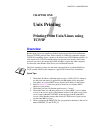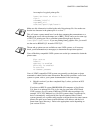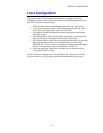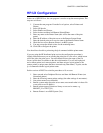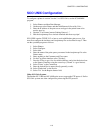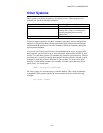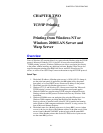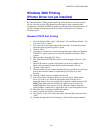
CHAPTER 1 UNIX PRINTING
1-9
Sun Solaris 2.x Configuration
Sun Solaris 2.x uses the lpsystem and lpadmin programs for remote printer
configuration:
lpsystem -t bsd prnservername
lpadmin -p queue -s prnservername!prnserverservice
accept queue (not required on newer Solaris systems)
enable queue (not required on newer Solaris systems)
Where queue is the name of the local print queue.
prnservername is the name of the print server (must match the entry in the
/etc/hosts file or IP address).
prnserverservice is the print server BINARY_P1 or TEXT_P1 service.
If this is the first printer configured, you must also use the lpsched command prior to
the accept command.
As an alternative, you may use Printer Manager in the Admintool utility under
OpenWindows. Select Edit, Add, and Add Access to Remote Printer. Then enter the
print server name in the format prnservername!\prnserverservice as
described above. Make sure that the Printer Server OS is set to BSD (the default
setting), and click Add.
Note that we recommend that you use the /etc/hosts file for the printer name rather
than NIS or other name services. Also note that due to a bug in the Sun lpd
implementation on Solaris 2.4 and earlier releases, you may experience problems
printing very long print jobs. If this is the case, a workaround is to use the raw TCP
port software as described later in this chapter.



